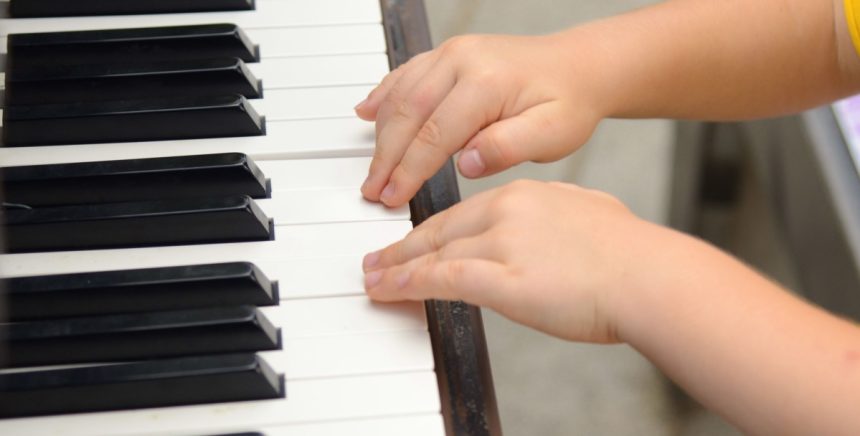Sue Lowry is one of four finalists in the Telstra ARIA Music Teacher Award 2023. It’s an award that reflects her commitment to her role at Southport Special School. Her nomination was revealed by former Yellow Wiggle, Emma Watkins.
“When I heard I’d been nominated for the ARIA, I was quite surprised,” Ms Lowry says in the ARIA-produced video of the announcement. “Very humbled, really, that the work we do here at Southport Special was being recognised.”
Ms Lowry was an experienced special needs teacher with a music degree and a background in music performance when she was invited to take over teaching music at the south-east Queensland school eleven years ago.
Before she started, she says, “I did as much research as I could and a lot of reading about what was best practice in music education for students with special education needs”.
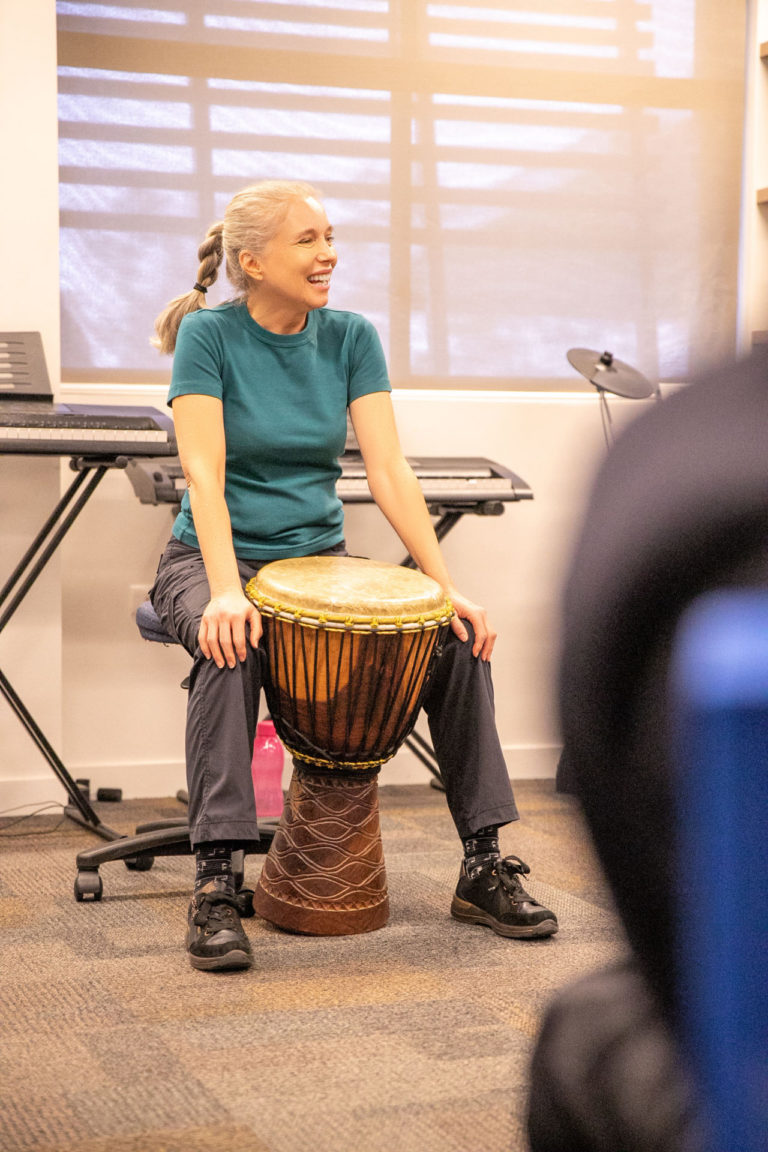
“What I found was a very patchy body of knowledge, which either focused on developing early communication concepts through music, or on songs and games which could teach very basic music concepts such as stop and go, loud and soft. The majority of these songs and games had a very early learner feel to them and not something I would really feel comfortable doing with eighteen-year-old, quite street-wise young men,” she told The Bursar.
That insight made her realise that there was no handbook she could read to understand the best way to deliver a quality music program to the diverse population typical of any P-12 special school.
To be in line with best pedagogical practice, Ms Lowry says her approach was to focus on “what the students can do and what would engage them in learning”.
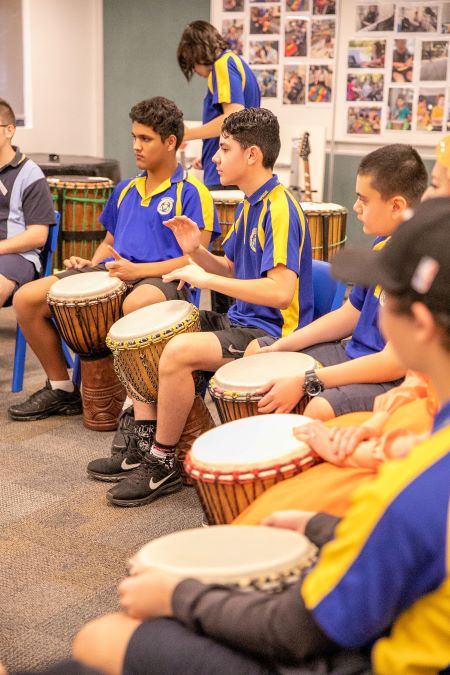
“In special schools, the underlying principle of teaching and learning is that all students, regardless of their level of disability, can learn and love to learn when provided a safe, supportive learning environment,” she says.
A drumming program introduced at Southport Special School was immediately popular with students who, from small beginnings, gradually learned to play up to four traditional African rhythms that locked together to create exciting and accurate polyrhythms. Alongside this, they learned the importance of practice and rehearsal to hone their skills.
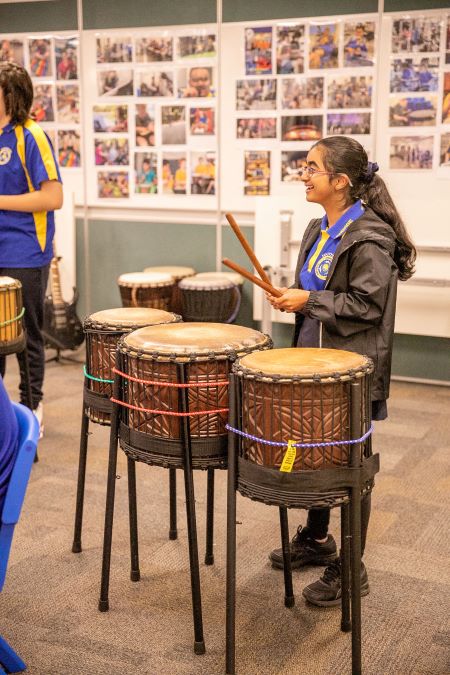
“Traditional music pedagogy says that the understanding of pitch and melody develops from childhood songs, which can be a challenging when working with students who are pre-verbal,” Ms Lowry told The Bursar. “The next step was helping students to understand pitch and melody resulting in learning to play melodies and harmonies on tuned instruments and learning to play in unison and ensemble.”
To support her teaching, Ms Mowry reached out to the mainstream Music Mates Program and worked with them to develop, trial and hone their programs to meet the needs of students with significant learning difficulties. It soon proved that the Southport Special School students could learn a variety of instruments.
Read more: The ARIA Music Teacher award nominations are a reminder that music education matters
Today, Ms Lowry says, “like their mainstream peers, our students could and do engage in the Music Mates Program where they learn to play drums, bass guitar, keyboard, vocals and perform pop songs and classic rock songs and perform alongside profession musicians”.
She says that, in the Gold Coast community where she lives and works, there has been “a quiet evolution in music education and expectations”.
At the Gold Coast Eisteddfod, where Southport Special School students were once the only special needs students invited to play actual rhythms, chords and melodies in instrumental ensembles in the Young People with Disability Section, other special schools and special needs units in mainstream schools are now setting the bar higher for their students.
“Southport Special School No.1 Drum Ensemble has, for the last seven years, competed against their mainstream peers in the Secondary Percussion Ensemble Section of the Gold Coast Eisteddfod,” Ms Lowry told The Bursar. “Over that time, they have developed their skills and have become respected competitors and have so far been award three third places, as well as a first place in the Open Untuned Percussion Ensemble at the National Percussion Eisteddfod.”
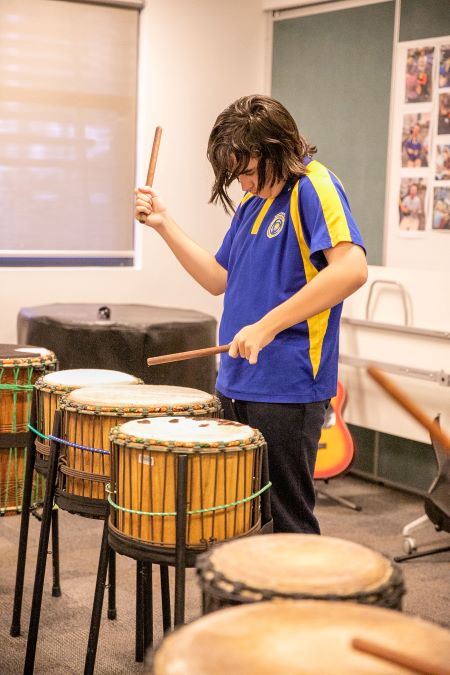
Music Mates, who trialled and honed their program for students with special needs at Southport Special School, now deliver it at other special schools.
The value of music education, Ms Lowry says, is growing in the eyes of the school’s parents.
“Ten years ago, there were two boys learning drums,” she says. “Now, countless parents are investing in private music lessons for their children.”
Students at Southport Special School are now involved in piano, drum, guitar, violin, singing, and musical theatre lessons, says Ms Lowry. As a community, she says the school is also finding a corps of private music teachers who are developing their skills in teaching students with significant learning disability and complex needs.
“Our parents are becoming strong advocates for value of music education for their children with disability. If their child leaves us to attend another school, one of the questions they ask is about the quality of music education, and the parent grapevine means that many new students come to our school for the opportunities in music it offers,” Ms Lowry told The Bursar.
The change has seen music education for students with disability in south-east Queensland continue to evolve, and, Ms Lowry says, “the glass ceiling of expectation is continually being shattered by the students”.
“The more they achieve, the more those who work in the special needs and mainstream sectors can see music as a vehicle for pushing the envelope of what is expected or possible.”
For the students with the most profound multiple disabilities, Ms Lowry says music education can be about focusing on their vocalisations and methods of making sounds with instruments, “so that you join them in their music-making, developing exchanges of vocalisations or sounds that maybe random at first, but over time may develop into an idiosyncratic call and response entirely composed by the student”.
“Music-making, yes – but also developing the fundamentals of communication, the turn taking exchange, which is the basis of language and dialogue, and giving students the space and time to develop the motor planning to develop fine and gross motor skills,” she told The Bursar.
“For students who are pre-verbal and have trouble focusing on anyone or anything, the rhythm and repetitive nature of songs and actions can speak louder than words. For many of these students, the first recognisable word they speak can be the lyrics of a song or the first action they purposely try to copy is during an action song.”
The school’s strong community connections have enabled it to run the Music Mates Program through funding from the Rueben Pelerman Benevolent Foundation, as well as Variety – The Children’s Charity Queensland and the Gold Coast Community Fund.
And that supports means a wealth of opportunities for the students, their families, and their teachers.
“We actively strive to give our students performance and music workshop and collaboration opportunities with other young musicians. This has resulted in burgeoning collaborations with the Queensland Youth Orchestra and the Music Department of Coomera Anglican College,” Ms Lowry says.
Music education, she says, is “woven into the fabric of Southport Special School”.
“It is valued by students, staff, and families. Every student at Southport Special School is a musician in the making. We just need to find a way for their music to be developed and to be heard.”


